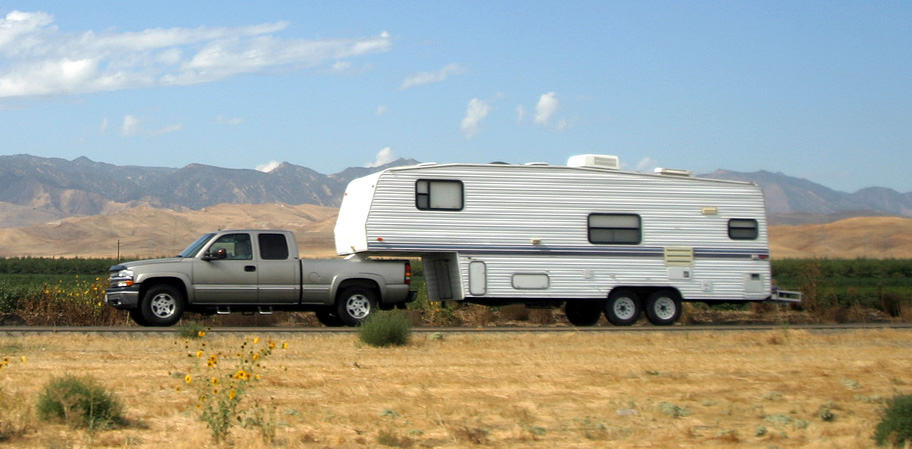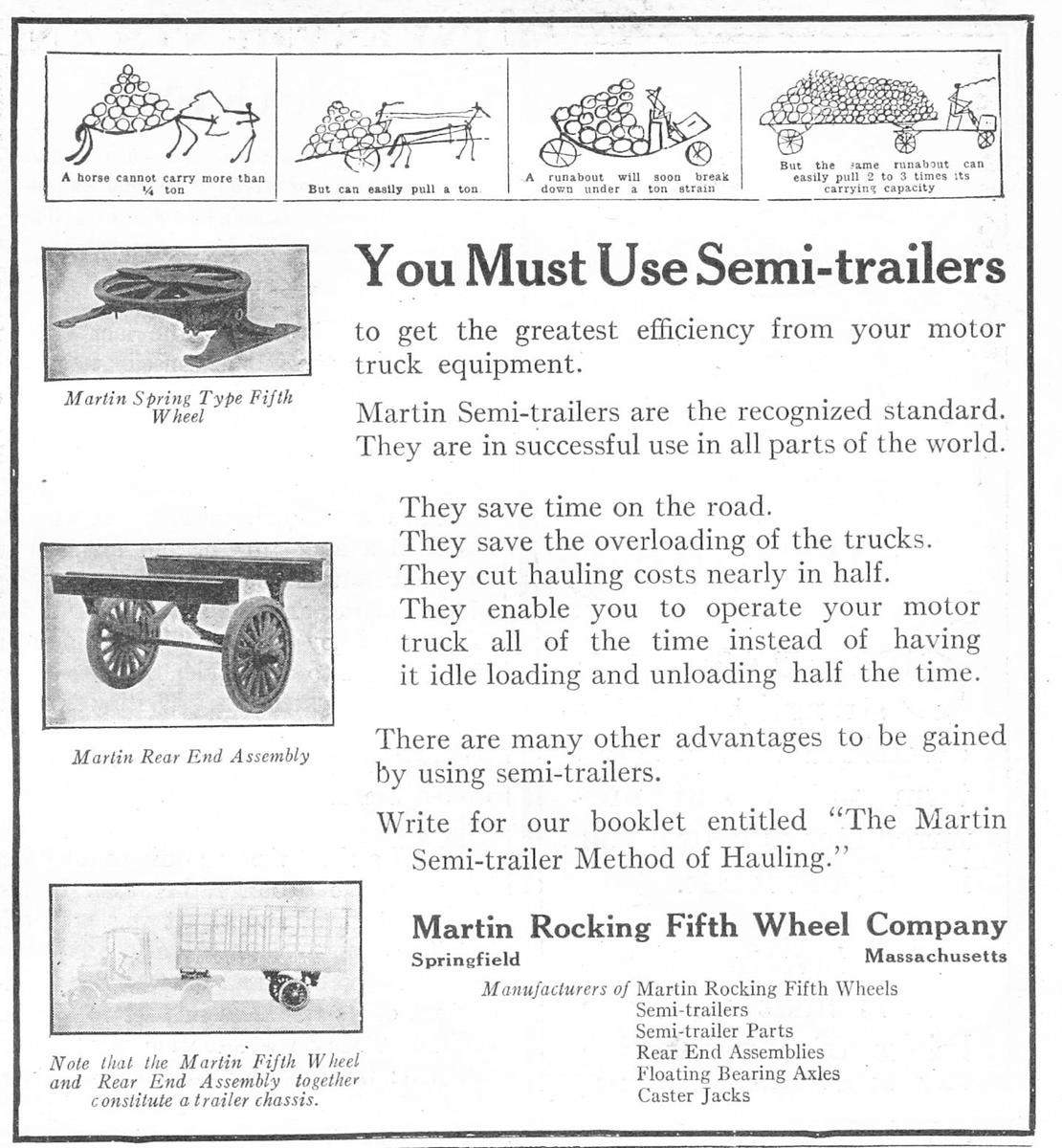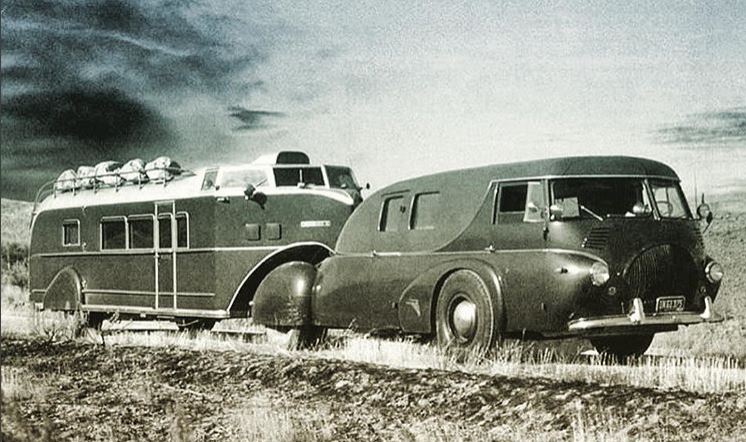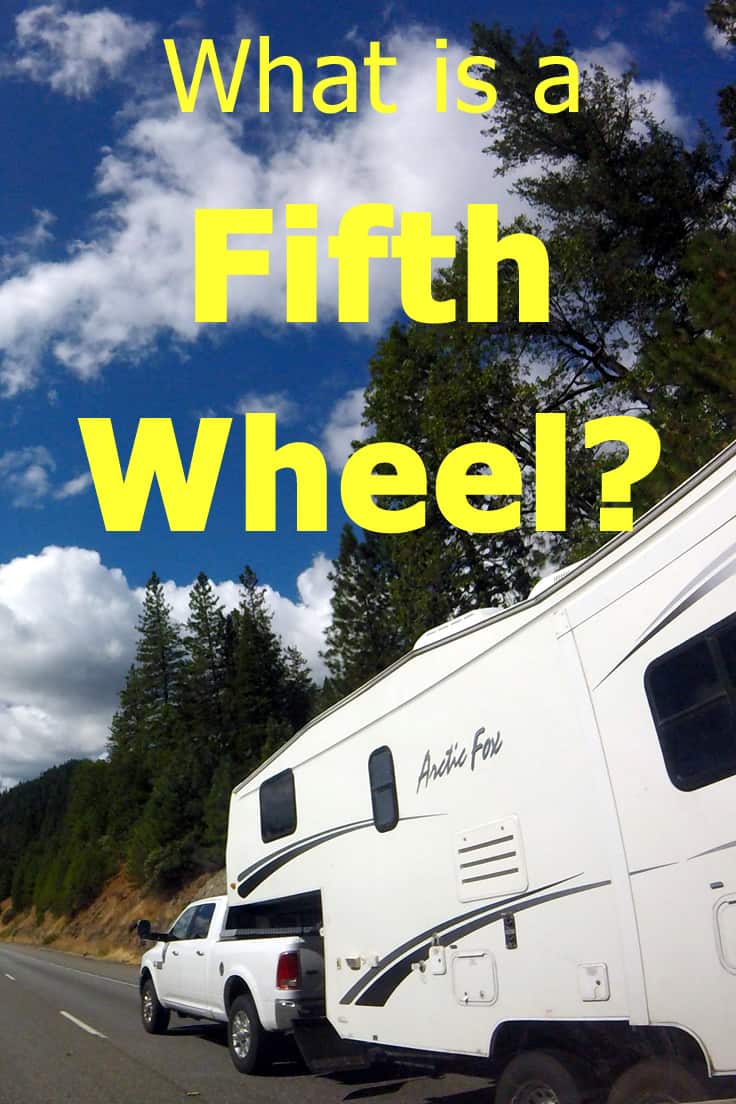New to RVing and not sure what the term “Fifth Wheel” even means? We have some answers for you, along with an analysis of the pros and cons of 5th wheels trailers, and a list of popular models.
First things first. The term “5th wheel” actually refers to a towing hitch. The hitch has a round part which – if you use your imagination! – looks like a wheel. Since the vehicle already has four wheels of its own, that makes the hitch the fifth wheel.
In common use, 5th wheel refers to a type of trailer which can be towed with a 5th wheel hitch. These trailers have a unique shape that allows the front of the unit to be hitched on the top of a pickup truck’s bed. The recommended hitch would be a 5th wheel hitch, hence the name of the trailer.

[toc]
So, What's a 5th Wheel RV?
Essentially, it is a type of camper trailer which hitches to the bed of the truck via a 5the wheel hitch and a kingpin. Only a pickup truck can be the towing vehicle of a 5th wheel.
This type of towing provides more stability which means less sway compared to towing with a trailer hitch. That allows for a larger towable, as long as you use a tow vehicle (pickup truck) that's powerful enough to pull the weight and has the right towing capacity.
Due to them being more stable, 5th wheels tend to be heavier and larger than travel trailers. Being larger, they provide more living area, and as such, tend to be a favorite choice among full-time RVers.
We'll talk more about types of 5th wheels and show you examples further down this post. For now, here's one more question -
Are 5th Wheel Hitches Used Only for 5th Wheel RVs?
Most certainly not!
Fifth wheel coupling is actually used across the trucking industry. When you see a big semi-trailer, it's probably pulling the trailers with a 5th wheel type of hitch. These hitches are also used in tractors.
And that tells you something.
5th wheel hitches are very strong. Once properly installed, they can be very reliable in towing heavy weights while reducing sway.
And that's exactly why 5th Wheel trailers can be larger and heavier than regular travel trailers or campers. Towing them requires a stronger pickup truck but once you have the torque and horsepower, the hitch itself allows you to pull a heavy 5th wheel with ease.
The History of Fifth Wheel Hitches
Did you know that the 5th wheel is older than the engine? 5th wheels were used in horse carriages. Simply as a sturdy hitch that allows the carriage to turn as needed. Here's the description from Wikipedia -
Basically a wheel was placed on the rear frame section of the truck, which back then only had four wheels; this wheel that was placed on the frame was the "fifth wheel", hence the name. The trailer needed to be raised so that the trailer's pin would be able to drop into the central hole of the fifth wheel.
The use of 5th wheel hitches for motorized trucks began in the early 20th century. The device was created and patented by Charles H. Martin of the Martin Rocking Fifth Wheel Co. He invented the strong metal 5th wheel hitch which can be easily engaged and disengaged, allowing trucks to carry heavy trailers across the country.
As you can see in this old advertisement, the original 5th wheel hitch was actually... a wheel!

The History of Fifth-Wheel Trailers
Travel trailers, in general, existed as far back as the 1920s. The daring people who rode and even lived in these vehicles earned a not-so-nice nickname, the “tin can tourists.” In the decades to follow, the opinion of trailers in general changed, becoming more favorable. That’s because trailers themselves were different. They were now larger and actually habitable.
But what about the first 5th wheel?
The first one was built by aircraft engineer Glenn Curtiss from Michigan in 1936. It was called the Curtiss Aerocar and already had that unique 5th wheel look.

What’s the Average Size of a Fifth-Wheel?
The average fifth-wheel trailer is about 32 to 35 feet long. On the shorter end, smaller fifth-wheels may be as little as 25 feet in length. Bigger trailers might stretch all the way to 40 feet, which is significant.
Fifth-wheel trailers with an average or longer length may have space for many accommodations, such as:
- A full-sized shower
- Electric fireplace
- King-sized bed
- Washer and dryer
- Bay windows
- Slideout kitchen pantries
- Sizeable recliners
- Full-sized appliances
The width of fifth-wheel trailers is typically between eight and nine feet. That makes this vehicle spacious enough for at least four passengers, sometimes even eight. There’s often just one bedroom with a single large mattress in most fifth-wheel floorplans. With pull-out beds, couches, and even space for sleeping bags or air mattresses, though, everyone can sleep comfortably with the right floorplan and a little creativity.
How Much Does a Fifth-Wheel Trailer Cost?
Let’s talk about the burning question: how much are you going to pay for a fifth-wheel trailer? The answer depends on whether you’re buying the vehicle new or used. The condition of the vehicle, the manufacturer, and its popularity can all dictate how much you’ll pay as well.
To give you a decent idea of the cost of a fifth-wheel trailer, we’ve dug around online to find some average prices for these vehicles. These are for newer and older fifth-wheels alike.
The prices are as follows:
- 2017 Keystone Montana 3160RL: $46,900
- 2017 Jayco North Point 377RLBH: $58,500
- 2013 Keystone Montana 3750FL: $49,985
- 2019 Jayco North Point 383FKWS: $65,988
- 2014 Forest River XLR Thunderbolt 395AMP: $49,999
- 2017 Grand Design Solitude 300GK: $59,000
- 2016 Jayco North Point 301RETS: $42,000
- 2019 Keystone RV Montana 3791RD: $68,990
- 2017 Forest River Riverstone 38RE: $97,000
- 2017 Heartland Cyclone 4005: $50,000
- 2019 Forest River Impressions 34MID: $34,999
Don't buy a 5th wheel if you don't know this inspection checklist first.
How Many People Use These Trailers?
If you’re considering getting a fifth-wheel trailer of your own, another question you might have is how many other people like you are out there?
To answer that question, let’s turn to the October 2019 report from RV Industry Association. The report found that ownership of fifth-wheel trailers was at 7,804 for October 2019. Last year, ownership was fairly higher at 8,145. That’s a 4.2% decrease from the previous year. The cumulative ownership in 2019 is 63,859, while it was at 76,474 in 2018. The YOY drop between the two years is 16.5 percent.
That means there are tens of thousands of fifth-wheel trailer owners across the country as counted by this RVIA survey. Who knows? There could be even more still! If you want to join the ranks, you’d certainly be in good company.
Should You Get Your Own Fifth-Wheel?
Fifth-wheel trailers cost several tens of thousands of dollars. Even used vehicles from four or five years ago will set you back five figures. Since they’re such a big investment, you should carefully weigh the pros and cons of fifth-wheel trailer ownership.
Pros of Getting a Fifth-Wheel
Owning a fifth-wheel certainly does have its perks. The bigger models can be as spacious as a Class A motorhome, which is generally the biggest RV you can own. Even though they’re often lumped in with travel trailers, fifth-wheel trailers are much larger. That means, as mentioned before, there’s room for full-sized appliances and plenty of other luxuries.
With their pickup truck setup, you can take your fifth-wheel trailer almost anywhere. From camping to traveling the world, this is one reliable setup you can trust. Part of that reliability comes with the fifth wheel’s design. Its center hitch makes it less likely to jackknife, which is when the trailer moves separately from the truck. You can even back up with more ease than other types of trailers.
If you’re worried about your setup being too long, that’s not often the case with fifth-wheel trailers. Since they fit in the truck bed, they take up less space than other trailer setups. Say, for instance, you had a pickup truck and a travel trailer. The trailer doesn’t fit in the truck, but rather behind it. That makes it much longer than a fifth-wheel trailer with the same truck.
Cons of Getting a Fifth Wheel
While fifth-wheels are safe and maneuverable, that doesn’t mean they’re not without their cons.
The big one is the price. You’re paying about as much as you would for some Class A motorhomes and many Class B RVs. When you consider that most travel trailers cost somewhere in the ballpark of $23,000, you’ll pay twice or thrice that for a fifth-wheel. Yes, they’re bigger, but is that extra cost worth it? Only you can decide.
Another con is you must own a pickup truck to use a fifth-wheel trailer. If you have any other vehicle type, such as an SUV, then you’re out of luck. By the time you factor in the price of buying a new vehicle and a fifth-wheel, you’re better off skipping this trailer type altogether.
Although fifth-wheel trailers are often big and heavy, that’s not always a good thing. Their weight means that only the most powerful (and thus the most expensive) trucks can haul them. If your truck is older or lacking in horsepower, then a fifth-wheel trailer might not be a good fit. A Ford F-150 is generally not a good candidate for towing a 5th wheel.
Also, all that heft means you may struggle when it comes time to park your fifth-wheel. Fitting it in your driveway is a pain, but squeezing the trailer in your garage is even more difficult. You may have to pay a premium at campgrounds and other park sites because your vehicle setup takes up so much room.
That said, there are a number of small 5th-wheels to choose from.
Check this for more 5th wheel towing tips.
Examples of Popular Fifth-Wheel Trailers
If you’re still interested in a fifth-wheel trailer, we thought we’d end this article by sharing some of the most popular brands and manufacturers. These aren’t the cheapest trailers by far, but if you’ve decided the financial investment is worthwhile, we think these brands are a good place to start shopping.
Coachmen’s Chaparral
The Coachmen Chaparral is a mid-profile trailer that is one of the standouts from this manufacturer. All floorplans have room for a queen-sized bed, and some can even squeeze in several bunk beds and a second queen-sized mattress! There’s a full bathroom and kitchen as well so you can bring all the comforts of home with you.
View this post on Instagram
Here are some other features of the Chaparral:
- Bathroom medicine cabinets
- 15,000-BTU Mach Air main air conditioner
- Hot/cold outside shower
- Kitchen cabinet and drawers
Coachmen’s Brookstone
Another great fifth-wheel from Coachmen is their Brookstone. Although there are fewer floorplans to choose from than the Chaparral, you get more sitting and storage space. Their 395RL floorplan, for instance, includes a bedroom dresser (and a 60x80 queen-sized bed), a sofa, a flip-down bunk, and a second hide-a-bed sofa.
View this post on Instagram
Other noteworthy features for the Brookstone floorplans are:
- A Consumer-Inspired package with a 12 cubic-foot refrigerator, a bathroom linen closet, full-sized clothes basket storage, and a phone charging station
- 40-inch HD LED TV bunkroom hookups
- Leather theater seating
- MCD day/night roller shades
- Kitchen and bedroom power vent fans
Redwood RVs
Redwood RVs manufactures a series of fifth-wheel trailers, the biggest of which are over 41 inches long. If you’re looking for a large fifth-wheel then, this is the brand you might want to consider. While the floorplans are less spacious than Coachmen’s fifth-wheels, you still get a king-sized bed, armoires and wardrobes, a trifold sofa, a full bathroom, and a full kitchen with the RW396/3961RK floorplan.
View this post on Instagram
These fifth-wheels are also known for:
- Living room ceiling fan
- Fireplace that burns at 5,100 BTUs
- Over-island kitchen lighting
- Crown molding
- 35,000-BTU furnace
- Power management system
- Flex foil insulation flooring
DRV’s Mobile Suites Luxury Fifth-Wheels
The lap of luxury is never too far away in DRV’s fifth-wheels. These are available in a shorter 36-inch length or a huge 44-inch whopper. You’d be hard-pressed to find a fifth-wheel trailer longer than that.
DRV’S floorplans include a king-sized bed, two full bathrooms, a spacious full kitchen, and plenty of seating options that can double as beds.
Forest River’s Arctic Wolf
Our last pick for exemplary fifth-wheel trailers is the Arctic Wolf from Forest River. With new floorplans still being added, there are plenty of options to choose from.
Some features you might enjoy in your fifth-wheel are a queen-sized bed (some with storage beneath the bed), linen closets and wardrobes, full-sized large bathrooms, a roomy kitchen, a dinette, and extra seating.
View this post on Instagram
Arctic Wolf fifth-wheels also boasts the following features:
- Six-and-a-half-foot slides
- Panoramic windows
- Fireplace that burns at 5,200 BTUs
- High-circulation ceiling fans
- 15k air conditioner
What are the Other Types of RVs?
RVs are generally classified under two categories -
Motorhomes - where you have a single unit including the engine and the living area.
Towables - where you have a trailer attached to a tow vehicle.
These are further broken down into specific types. If you want to learn more, check out our post about the 7 types of RV's right here.
Over to you
Do you own a 5th wheel? Are you planning to get one? We'd love to hear your opinion on this type of RV so please do leave me a comment below! Or just take this quick survey -
If you enjoyed this post, please share it around!
Here's an image you can use for Pinterest -


